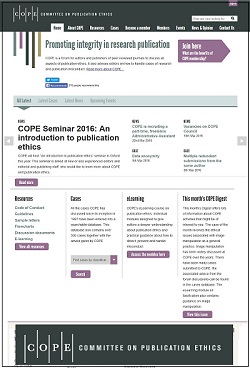Resumo
COPE is just one of a number of organisations that is seeing a large rise in applications for membership from new journals. Although we very much want to encourage and support legitimate new journals, we are also mindful that many new journals are not currently sufficiently transparent about their business practices and authors in particular may be unable to judge the legitimacy of these journals. Together with OASPA, DOAJ, and WAME we have therefore compiled a minimum set of criteria that journals will be assessed against when they apply for membership at one of our organisations. The full criteria can be seen here and we welcome feedback. We encourage authors and anyone else who is unfamiliar with a journal to use these criteria in assessing a journal. The Committee on Publication Ethics (COPE) was established in 1997 by a small group of medical journal editors in the UK but now has over 10 000 members worldwide from all academic fields. Membership is open to editors of academic journals and others interested in publication ethics. COPE provides advice to editors and publishers on all aspects of publication ethics and, in particular, how to handle cases of research and publication misconduct. It also provides a forum for its members to discuss individual cases. COPE does not investigate individual cases but encourages editors to ensure that cases are investigated by the appropriate authorities (usually a research institution or employer). All COPE members are expected to follow the Code of Conduct for Journal Editors. COPE has produced an eLearning course for new editors. Eleven modules in total, the course currently includes: An Introduction to Publication Ethics, Plagiarism, and Authorship among others. COPE also funds research, organises annual seminars globally and has created an audit tool for members to measure compliance with its Code of Conduct and Best Practice Guidelines for Journal Editors.
Referências
i. MIAME (Minimum information about a microarray experiment): http://www.mged.org/Workgroups/MIAME/miame.html.
ii. CONSORT statement (and other reporting guidelines) can be found at: www. equator-network.org.
iii. BMJ transparency policy: http://resources.bmj.com/bmj/authors/editorial-policies/transparency-policy.
iv. Marusic A, et al. How the structure of contribution disclosure statements affects validity of authorship: a randomized study in a general medical journal. Curr Med Res Opin 2006;22:1035-44
v. ICMJE (International Committee of Medical Journal Editors) uniform requirements for manuscripts submitted to biomedical journals: http://www.icmje.org/urm_main.html
vi. Responsible research publication: international standards for authors (Position statement developed at the 2nd World Conference on Research Integrity, Singapore, July 2010) In press, 2011).
vii. World Association of Medical Editors statement on the relationship between journal editors-in-chief and owners: http://www.wame.org/resources/policies.
viii. World Medical Association Declaration of Helsinki: http://www.wma.net/e/ethicsunit/helsinki.htm.
ix. American Educational Research Association ethical standards: http://www.aera.net/AboutAERA/Default.aspx?menu_id=90&id=222.
x. American Psychological Association ethical principles: http://www.apa.org/ethics/code/index.aspx.
xi. British Educational Research Association ethical guidelines http://www.bera.ac.uk/publications/guidelines/.
xii. Good Clinical Practice: http://www.emea.europa.eu/pdfs/human/ich/013595en.pdf.
xiii. US Department of Health and Human Services Guide for the Care and Use of Laboratory Animals: http://www.nap.edu/readingroom/books/labrats/.
xiv. COPE flowcharts: http://publicationethics.org/flowcharts.
xv. COPE retraction guidelines: http://publicationethics.org/files/u661/Retractions_COPE_gline_final_3_Sept_09__2_.pdf.
xvi. De Angelis C, et al. Clinical trial registration: a statement from the International Committee of Medical Journal Editors. Lancet 2004;364:911-2.
xvii. PubMed Central: http://www.pubmedcentral.nih.gov/.

